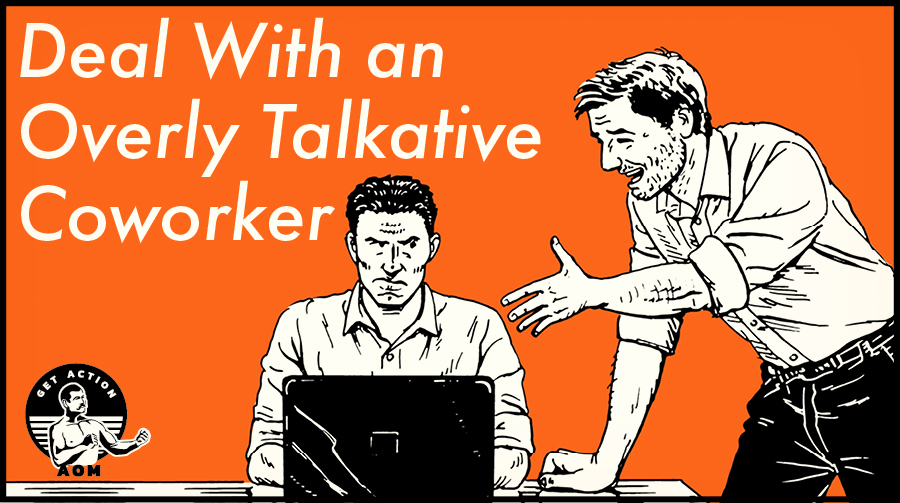You’re in your cubicle, minding your own business, when a coworker walking by stops to talk. Seems innocuous enough . . . except they do this multiple times a day. Most every day. While you don’t mind a little chit-chat with your officemates, the interruptions from this coworker go on too long, are banal, and/or are hindering your workflow and productivity.
What can you do about this kind of overly talkative coworker? Below we walk you through some options.
6 Tips for Dealing With an Overly Talkative Coworker
1. Small talk at work IS important; don’t shrug it off entirely. While small talk at work can sometimes seem dull and entirely unimportant, it’s actually a big piece of building a good office culture and bonding with your coworkers. You want to have rapport with them. How do you do that? Many times it’s through the small conversations you have throughout the day. Be open to them, at least some of the time. You don’t want to be so standoffish that you become known as the surly office grump who doesn’t ever talk to anyone except for official business matters.
If someone is talkative at work, use your practical wisdom to figure out if you just need to deal with it and make some small talk now and then, or if it’s truly disturbing your workday. If it’s the latter, consider the options below.
2. Wear headphones and/or make yourself look busy, but don’t do it unrelentingly. In the world we live in, wearing headphones is a common tactic for putting off an unapproachable, “do not disturb†vibe. If you’re actively typing away, if you have a focused look on your face while studying a report, if you have headphones in/on — you’re less likely to be interrupted by a chatty coworker. (If you have a private office, cutting down on disturbances is often as easy as closing the door; an open door generally invites some amount of chit-chat.)
That said, heed the above point: Small talk and general sociability is an important part of being a team player, so don’t always have your headphones in. It’s fine for a few blocks of focused work time during the day, but make a point to have them off at other times to make yourself a little more approachable.
3. Politely let them know you need to get back to work. If simply looking busy doesn’t do the trick, and you’re still interrupted on the regular, utilize any number of excuses that signify your need to get back to work; start with the preface, “I’d really love to chat more, but . . .†and then add something like “I’m on a deadline for this memo†or “I have a phone call later that I need to prepare for.†The rub, of course, is that these excuses can’t always be white lies; if you say you have a phone call in 10 minutes, and 10 minutes later you clearly don’t, what’s going on will be fairly obvious.
If you don’t really have a decent excuse, you can say something like “I wish I could talk more, but I’m really trying to be more focused with work, so I need to get back to it. We’ll catch up later at happy hour or something.â€
At this stage, be sure to use friendly tones to soften the blow — no need to be an ass here. Know that your coworker probably has good intentions — they’re not chatting with you to intentionally get you off track. It’s likely they’re just a talkative person and are trying to build some sort of connection, or they’re bored and they maybe don’t quite have enough to do with themselves.
4. If it’s work-related, schedule a meeting. If you’re regularly being interrupted, but about work-related chit-chat and questions, schedule a meeting to talk about it at length in a more focused manner. In some cases, the solution is really that simple. If the coworker comes back with something like, “Oh, it’s alright. No need for a meeting — I’ll just figure it out myself,†then it’s likely that their conversation wasn’t actually important, and you also just got out of it. Winning!
5. Confront them more directly about the inappropriate amounts of chit-chat. If the chattiness is becoming a chronic problem, and your friendly excuses or general “do not disturb†look haven’t been landing, your best recourse will be to have a more direct, slightly sterner conversation about it. It’s uncomfortable, of course, but sometimes necessary. Sure, you might get the silent treatment, but isn’t that what you’ve actually sort of been hoping for?
6. Speak to a supervisor. As a very last resort (that part is important), you can bring the issue up with a supervisor or with HR. If you’re having a big enough problem that you’re considering raising the issue with your superiors, chances are good that other people are being affected as well. A supervisor may be able to bring up the problem in less personal terms: “I’ve been hearing that your chattiness is hindering the productivity of others in the office.â€
With these tips, you’ll be able to mitigate the chatty interruptions and get back down to doing the work at hand.



